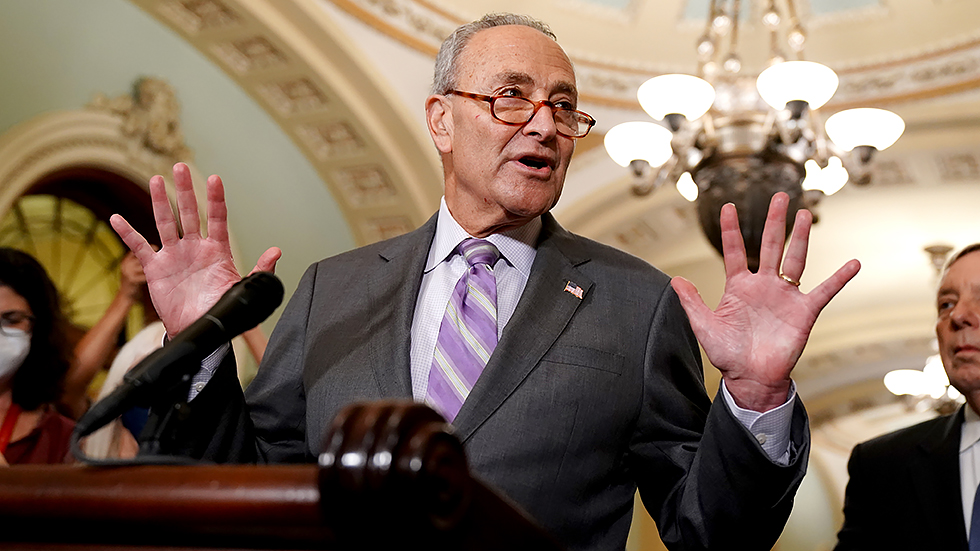On The Money — Presented by NRHC — Senate slowly walks back from debt disaster
Happy Thursday and welcome to On The Money, your nightly guide to everything affecting your bills, bank account and bottom line. Subscribe here: digital-stage.thehill.com/newsletter-signup.
Today’s Big Deal: Senators are going to see if they can keep the country solvent tonight. We’ll also look at Biden’s up and down relationship with big business and Democrats concerned about housing in the infrastructure plan.
But first, don’t mess with Woody Harrelson.
For The Hill, I’m Sylvan Lane. Write me at slane@digital-stage.thehill.com or @SylvanLane. You can reach my colleagues on the Finance team Naomi Jagoda at njagoda@digital-stage.thehill.com or @NJagoda and Aris Folley at afolley@digital-stage.thehill.com or @ArisFolley.
Let’s get to it.
Senate locks in deal to vote on debt ceiling hike Thursday

The Senate has locked in a deal to pass a short-term debt ceiling extension on Thursday.
Senate Majority Leader Charles Schumer (D-N.Y.) finalized the agreement to hold up to four hours of debate on the debt ceiling extension, followed by a key procedural hurdle to end debate on the bill, which will require 60 votes, around 7:30 p.m.
- If they overcome that hurdle, the Senate would then move directly to a vote to pass the short-term debt extension, a move that will only require a simple majority.
- Sen. John Thune (S.D.), the No. 2 Senate Republican, predicted that there would be 10 GOP votes to help end debate on the debt ceiling.
- “In the end we’ll be there, but it’s going to be a painful birthing process,” Thune said, asked about McConnell’s ability to 10 GOP votes to advance the debt ceiling hike.
But so far 10 GOP senators have not said yet that they would vote to end debate on the debt bill. And some Republicans are livid about the deal.
Jordain Carney has more here.
A MESSAGE FROM NRHC
We Believe in Rental Housing
Single-family rental home companies are helping residents experiencing economic hardship and ensuring a ready supply of quality, affordable, well-located rental housing.
LEADING THE DAY
Biden and big business: It’s complicated
President Biden has had an up-and-down relationship with business in the first year of his presidency that has seen him working with big companies on some issues and stoking fights with corporations on others.
The push-and-pull nature of the relationship has taken a central role as Biden seeks to move his two-part domestic economic agenda through Congress.
- Biden has been aligned with the business community on the $1.2 trillion bipartisan infrastructure bill, which was backed by some Republicans in the Senate and is a big favorite of Democratic centrists in the House.
- But Biden had dealt with pushback from business on the $3.5 trillion social spending measure, which would include a higher corporate tax rate. That measure is backed by progressives, many of whom are more cool on the infrastructure package.
The president for the most part does not take a hostile tone toward corporations, though he says they and the wealthy should pay “their fair share” when it comes to taxes. And he’s aligned himself with businesses where they’ve found common ground, including on Wednesday when he hosted executives from major companies at the White House to press Republicans on raising the debt ceiling.
Morgan Chalfant breaks it down here.
A MESSAGE FROM NRHC
We Believe in Rental Housing
Single-family rental home companies are helping residents experiencing economic hardship and ensuring a ready supply of quality, affordable, well-located rental housing.
BURNING BRIDGES
Rift widens between business groups and House GOP
Lobbying efforts by some of the nation’s biggest business groups are falling on deaf ears with House Republicans just a few years after the two worked in lockstep to craft the 2017 tax bill that delivered massive corporate tax cuts.
Even after every major business group in Washington, D.C., urged House Republicans to support the Senate-passed $1 trillion bipartisan infrastructure bill, only a handful of GOP lawmakers have said they would vote for the measure, according to The Hill’s tally.
The U.S. Chamber of Commerce, in particular, has drawn public attacks from House Minority Leader Kevin McCarthy (R-Calif.) and other Republicans, revealing deep divisions between the two forces that were closely aligned for decades.
“People care what their local Chambers of Commerce and business owners have to say, not the U.S. Chamber,” said Brett Horton, chief of staff to House Minority Whip Steve Scalise (R-La.). “If the U.S. Chamber sent me a meeting request right now, I wouldn’t even staff that meeting out to an intern, and I don’t see that changing.”
Karl Evers-Hilstrom tells us why.
CHOPPING BLOCK
House Democrats urge leaders to keep housing in reconciliation bill
House Democrats are pushing President Biden and party leaders to keep more than $300 billion for affordable housing in their sprawling social services and climate bill.
In a letter released Wednesday night, every Democrat on the House Financial Services Committee urged Biden, Speaker Nancy Pelosi (D-Calif.) and Senate Majority Leader Charles Schumer (D-N.Y.) to spare a historic investment in housing amid a historic rise in home prices and rents.
“It is abundantly clear that we will need long-term, equitable measures to help families recover from the effects of the pandemic by investing in housing stabilization, job creation, and increased economic opportunity,” wrote the Financial Services Democrats, led by Chairwoman Maxine Waters (Calif.)
Good to Know
Rep. Jared Golden (D-Maine) warned his colleagues on Thursday that the multitrillion-dollar social spending plan his party is working on “needs more work” to get his support.
Here’s what else have our eye on:
- Debt carried by former President Trump’s business has increased by about $200 million since he left office in January, bringing the total amount to $1.3 billion, Forbes reported on Thursday.
- President Biden on Thursday aggressively called for vaccine requirements as an effective tool to end the pandemic, arguing mandates had become necessary to turn the corner on the pandemic.
- Ireland will join an international tax agreement that provides for a global minimum effective tax rate of 15 percent for large multinational corporations, the country’s finance department announced Thursday.
- Robinhood’s legal chief at a Security Traders Association conference on Wednesday criticized the regulatory “nanny state.”
- New claims for unemployment insurance fell sharply last week after rising through most of September, according to data released Thursday by the Labor Department.
- The Federal Trade Commission (FTC) is warning of “significant financial penalties” for for-profit colleges if they deceive students.
That’s it for today. Thanks for reading and check out The Hill’s Finance page for the latest news and coverage. We’ll see you tomorrow.
Copyright 2023 Nexstar Media Inc. All rights reserved. This material may not be published, broadcast, rewritten, or redistributed. Regular the hill posts









